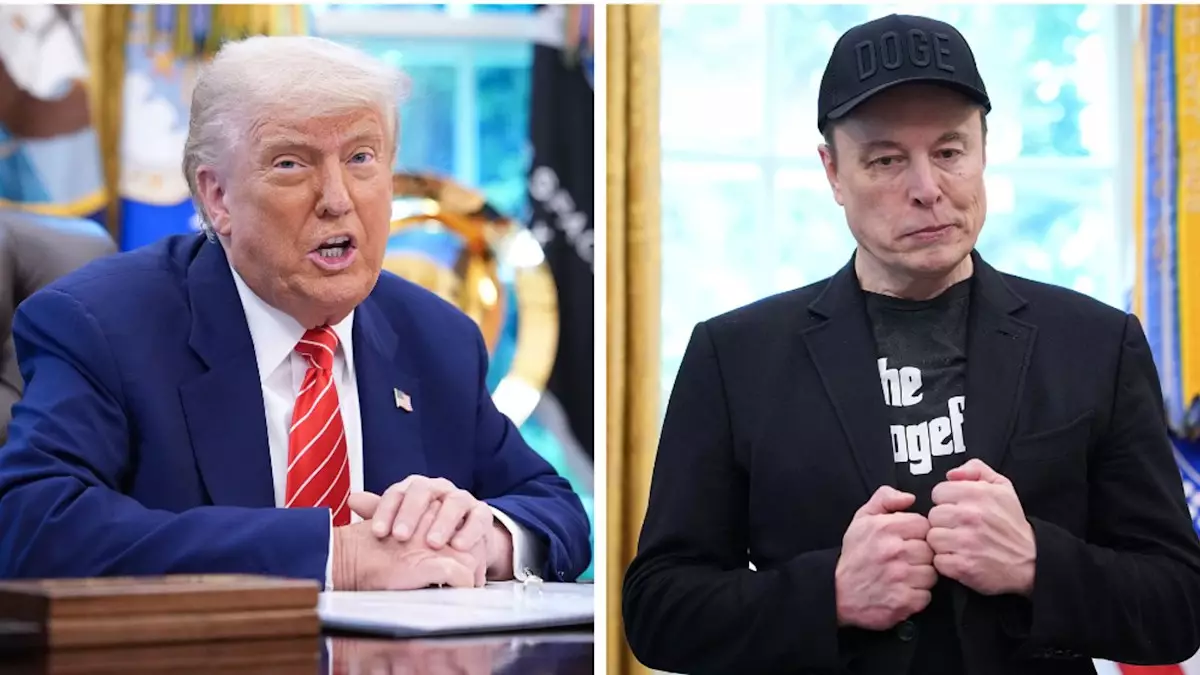In the fast-paced world of modern politics, alliances are often fluid, shifting with the whims of public sentiment and personal ambitions. The connection between tech billionaire Elon Musk and former President Donald Trump exemplified such a volatile relationship. Initially, their bond seemed forged in mutual admiration and shared interests, creating the illusion of a formidable partnership. Musk, a man known for disrupting industries and innovating on a grand scale, appeared to find a kindred spirit in Trump, whose populist rhetoric resonated with a wide swath of the American electorate. Their rapport was characterized by public expressions of support, significant financial contributions to Trump’s campaign, and a mutual fascination with revolutionizing government efficiency.
However, it appears that the spark fostering this political bromance was largely ignited by convenience. The narrative told in America’s media suggests that Musk, who had previously aligned himself with the Democratic Party, underwent a seismic shift in loyalty following Trump’s assassination attempt. His sudden endorsement, combined with a hefty financial contribution, seemed to reposition Musk as a staunch ally, particularly during the tumultuous 2024 election cycle.
The Illusion of Harmony
For a while, everything flowed seamlessly. Musk jumped onto the campaign trail, donating nearly $300 million and even being appointed head of the Department of Government Efficiency (DOGE), a vital role that gave him unique access to Trump’s inner circle. Their camaraderie was superficial yet strikingly public; Musk even labeled his affection for Trump in a tweet, suggesting a deep bond that transcended politics. But beneath this surface, fundamental ideological differences simmered, waiting for an opportunity to rupture the façade of unity.
This rift became apparent when Musk began to distance himself from active governmental roles. He exited DOGE, seemingly facing the reality of the growing discrepancies in their objectives. Expressing gratitude to Trump for the “opportunity to reduce wasteful spending” was more of a diplomatic exit than a sincere farewell. His criticism of Trump’s One Big Beautiful Bill Act laid bare a philosophical divide that had been lurking just beneath the surface – a disagreement about fiscal responsibility and governance that proved far more significant than their previous camaraderie.
Clashing Visions and Personal Attacks
The turning point arrived dramatically, characterized not just by political dissent but by personal attacks and accusations that unveiled a startling lack of integrity underneath their previous friendship. Musk openly chastised Trump’s proposed tax cuts and reforms as detrimental to American citizens, labeling them as “crushingly unsustainable” amidst growing national debt. Such rhetoric highlighted Musk’s capacity for independent thinking and indicated a potential return to his former progressive ideals.
In retaliation, Trump threatened to retract Musk’s government contracts, branding him as “crazy” in a not-so-subtle display of betrayal. This marked a significant shift from camaraderie to conflict, revealing an underlying desperation to maintain power. The personal attacks escalated, exemplifying Washington’s cutthroat nature, where friendships dissolve when faced with power struggles, ambition, and perceived ingratitude. Musk’s implication that Trump was beholden to figures like convicted abuser Jeffrey Epstein further injected poison into their relationship, elevating their quarterly reports of “bromance” to a level resembling bitter animosity.
The Fragility of Political Alliances
In the end, the Musk-Trump relationship serves as a compelling case study on the fragility of political alliances in this era. It underscores how personalities as influential as Musk can become collateral damage when ideological divides widen, dramatically altering fortunes and strategies. The episode not only reveals the complexities within political relationships but also suggests a growing distrust of cooperation where money and power collide. Ultimately, their split echoes larger themes in political discourse today, emphasizing that alliances fashioned from mutual benefit are often as fleeting as they are potent.
This alliance, founded on admiration and ambition, disintegrated under the pressures of divergent values and personal interests, revealing the precarious nature of political friendship in an arena dominated by suspicion and power plays. In an age where authenticity is often a rarity, it is particularly disheartening to witness figures of such prominence devolve from allies to adversaries in such a short period.###

